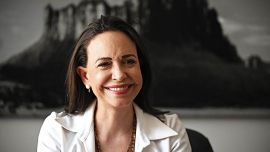Diego Maradona's death jolted Argentina. It was a challenge for the national government too. Maradona's wake was held in Government House last week. The doors were open and thousands filed past to pay their last respects. You know the news: eventually the hardcore football fans clashed with the Buenos Aires City Police when the doors of the presidential palace were closed in the afternoon. The clashes unleashed an argument between the Peronist administration and the Buenos Aires City government, headed by centre-right Mayor Horacio Rodríguez Larreta, over who was to blame for the use of force by the police. The national government has even sued Rodríguez Larreta, a potential opposition presidential candidate in 2023, holding him criminally responsible for the violence.
For most of the year, President Alberto Fernández and Rodríguez Larreta navigated the pandemic together, avoiding confrontation during the peak of the coronavirus crisis. But that initial congeniality is giving way to confrontation as next year's midterm elections draw ever closer. Now the Chamber of Deputies has approved a bill sponsored by the national government to reduce the share of federal revenue funds awarded to Buenos Aires City and allocate a fixed sum to bankroll the local police. The national government claims that Mauricio Macri, when he served as president, had unilaterally increased with the stroke of a pen the amount of funds designated for BA City, with the police funding the handy excuse. With tensions on the rise, Rodríguez Larreta is taking his case to the Supreme Court.
The City mayor usually tries hard not to stoke the flames of Argentina's infamous and incessant political rift. But this week, Rodríguez Larreta called a press conference and asked in public whether the Peronist administration’s intent is to defund the police to allow football hooligan gangs to go on the rampage. The question was rhetorical but it was sending out the message to voters in Buenos Aires City, a centre-right bastion. The problem for Rodríguez Larreta is that his complaints about daylight revenue robbery are not necessarily shared by the rest of the nation's rulers – the complaining resonates with voters in Buenos Aires City, but the rest of the country will not necessarily sympathise. Buenos Aires City has rarely voted Peronist historically.
Lawmakers from Córdoba Province, taking orders from a Peronist governor who is not part of the ruling national coalition, voted in favour of the bill. Another problem for the mayor, who has announced tax hikes to compensate for the cuts, is that he could be making too much noise, taking for granted that the Supreme Court will rule in his favour. Vice-President Cristina Fernández de Kirchner, the leader of the leftist Kirchnerite wing of the ruling coalition, is losing no time. She has singled Rodríguez Larreta out as the main oppositon rival to defeat in the future. What is not clear is if the president embraces her strategy. Fernández, early on in the fight against Covid-19, called Rodriguez Larreta his “friend”. There's no such talk now. Was it just for show, or has the vice-President forced Fernández, against his will, to cut ties with Rodríguez Larreta?
The president admitted in an interview that he no longer confers with Fernández de Kirchner on a daily basis. They both met briefly at Maradona's chaotic funeral last week, but reports said that it was a chilly encounter. The context of the spat is Argentina's ongoing negotiations with the International Monetary Fund (IMF) to reschedule the payment of US$44 billion.
The president has been fielding tough questions about a five-percent pension increase announced for this month. Critics say pensioners would be losing out to inflation this year. Jabs were thrown about Fernández embracing belt-tightening policies to please the IMF. The chortling got louder when it surfaced that the five-percent increase would be deducted from a future pension hike scheduled for March. The government has also changed the way pension increases are calculated. Judging by the negative headlines, pensioners were being short-changed. End of argument? Not quite: enter Fernández de Kirchner, head of the Senate.
The majority Peronist caucus in the Senate on Wednesday announced that the five-percent increase will not be subtracted from the March hike. The president said on Thursday the amendments, including awarding the hikes every three months and tweaking the rate that will be used to figure them out, were “a good idea.” The question again is if Fernández de Kirchner has suddenly turned against the pension reform designed by the president and Economy Minister Martín Guzmán to cut the fiscal deficit. Pundits could be soon asking themselves whether Fernández de Kirchner is game for backing the president's re-election bid in 2023. Both president and vice-president now seem to be speaking to each other with contradicting actions rather than words.
Is the IMF watching the latest pension saga unfold? The general impression here is that a new president in the United States, Joe Biden, will be a factor in Argentina's talks with the Fund. Fernández spoke with Biden on Monday. It was a straightforward diplomatic telephone conversation, right? Almost right. Fernández and Biden did make a point of speaking about Pope Francis and his influence in Latin America (Biden is a Catholic and met with Francis during his visit to the United States when he was vice-president). But a simple congratulatory call, with subtle references to the shared admiration for the Argentine-born pontiff that could come in handy in the future, turned into a diplomatic gaffe when Foreign Minister Felipe Solá (an old school Peronist with little political clout) claimed that the two leaders had also discussed the role of the US representative to the IMF in negotiations with Argentina.
Solá’s take in public was that Argentina is not happy with the work of the current US official in the IMF (named by outgoing US President Donald Trump) and that it is waiting for Biden to name a friendlier technocrat when he takes office in January. The rest of the Argentine government, including the president, scrambled to deny Solá's comments. Fernández even called his foreign minister’s words “imprudent.” Where does that leave the foreign minister? In a very uncomfortable position – that's where.



















Comments